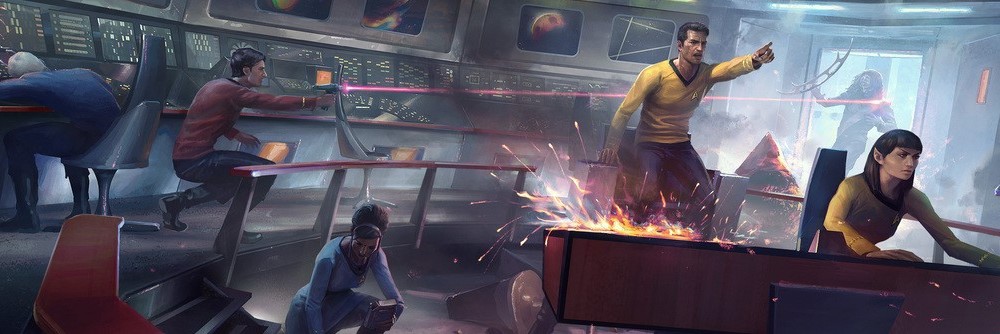
Star Trek Adventures RPG
Bought the PDF. Started watching all things Trek. Dreamed about Trek. Played Star Trek Online. Setup a roll20.net game. Still, I can’t shake thinking about this game. Probably because I still haven’t found time to actually play it.
Star Trek Adventures looks aesthetically great and captures the feel of Star Trek. It uses the 2d20 system where you roll (wait for it …) 2d20 and attempt to roll under a target number based on your stats. At first, I was hesitant about the system, because, you know, it’s not Fate (but, hey, what is?) After reading through the rules, however, I noticed they took a Q from Fate and essentially incorporated aspects as well as zones. Maybe this has something to do with my current crush on this bad boy.
Special Dice
I like that they are using 20-sided dice. Face it, rolling twenties is fun. More fun than six-siders. But, they threw in six-siders, too, for you old-schoolers. My only issue is that their six-sided dice are special dice that don’t have your standard numbers on them. Instead, they are a bit like Fate dice (hmm, I’m detecting a trend here.) 2 of the sides have an effect that might trigger some special abilities when you roll them. For example, a vicious weapon will inflict additional damage for each effect that shows on the dice face. I feel this is a fun way to give some variation to your weapons.
Star ships are people too!
First thing, the ships are treated like a character, which means you don’t need to learn a whole new way of doing things when you start using your ship. There are a few extra items in there, but, essentially, it’s a character.
What differentiates ships from characters is their scale. Scale is a representation of how big something is compared to something else. Ships also track breaches, which are an indication of how deeply any damage has invaded your ship.
The Trek-verse
They’ve put tons of information about the Trek-verse in the book. Some of the information is pure knowledge dump, but there’s also data presented as communications from famous people from the movies and TV shows.
They also cover many of the races, particularly the more popular and involved races from the tube. Also, even though the game’s setting is in the 24th century, with a few minor tweaks (like removing some equipment and ships from play) you can choose any setting from Original Series onward.
So. Many. Actions.
During a conflict, there are Minor Actions and Tasks. Minor Actions are limited to one per turn but include drawing a weapon, dropping prone, standing up, etc. Tasks are the big things: punching someone in the face, firing phasers, sprinting all out, creating advantages (Hey! More Fate!), etc.
Star Ship combat adds an additional layer of options based each of the major ship posts: tactical, helm, sensor operator, security, communications, etc. They all have unique actions that only a character at that post can perform.
I can’t decide whether I love this or hate it, but there are a ton of actions you can perform. My first thought is that you’ll be scoring the book constantly during combat because of how many things you can do. Maybe with a good GM Screen that summarizes everything this will turn into less of an issue, but for your first several games I can tell you, you will be abusing your beautiful book.
Final Thoughts
This game feels like Fate + Crunch. Which I think sounds awesome. I’ll report back after I really play it and let you know how it went down. Until then, live long and prosper.
P.S.
Oh yeah, there’s also a living campaign that you should really check out if you end up playing. Hopefully, they can keep up with the content, but so far, so good. You can sign up for it in the sidebar on the main web page.
